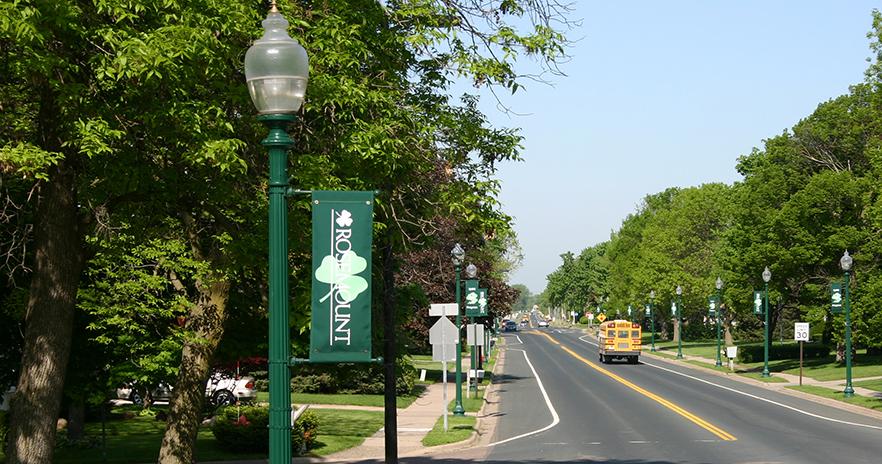Contacts: Mike Greco, Resilient Communities Project, [email protected], 612-625-7501; Alan Cox, City of Rosemount, [email protected], 651-322-2078
MINNEAPOLIS / ST. PAUL (03/26/2014) — The University of Minnesota’s Resilient Communities Project is pleased to announce that the city of Rosemount has been selected as its partner community for the 2014–2015 academic year. The partnership will bring the expertise of hundreds of graduate students and the University to sustainability-related projects identified by Rosemount city staff and community partners.
“As we plan for Rosemount’s future, it’s a top goal of the City Council to work toward the community’s environmental, financial, and cultural health,” said Rosemount Mayor Bill Droste. “It will be a great advantage to consult with the University of Minnesota on ways to make Rosemount a more sustainable community for our growing and diverse population.”
RCP organizes yearlong partnerships between the University of Minnesota and Minnesota communities. Each academic year, RCP chooses a community partner through a competitive request-for-proposal process, helps identify potential projects based on community-identified sustainability issues and needs, and matches the community’s project needs with University of Minnesota courses.
The program was launched during the 2013–2014 school year, when RCP worked with Minnetonka on 14 projects that engaged 25 classes and more than 200 students across eight colleges at the University of Minnesota. Student work helped the city to advance initiatives to reduce phosphorous and sediment pollution in local lakes and rivers, evaluate and improve local housing assistance programs, plan for transit-oriented development around future light-rail stations, reduce traffic congestion, and increase engagement with local residents. RCP is concluding its current academic year partnership with North St. Paul, which has matched more than 40 courses and 300 students with 17 projects, from implementing a “living streets” policy and creating environmental education programming for local parks to helping residents age in place and promoting redevelopment and pedestrian improvements in the downtown business district.
The partnership provides the community with access to students from a wide range of programs and disciplines—from architecture, planning and engineering to business, environmental sciences and the humanities. Through work with RCP, the community is able to enhance its own capacity to advance sustainability. Students who participate in RCP projects benefit from real-world opportunities to apply their knowledge and training and bring energy, enthusiasm and innovative approaches to address local issues.
“We are looking forward to working with Rosemount as our next community partner,” said RCP director and Humphrey School of Public Affairs associate professor Carissa Schively Slotterback. “The City’s proposal showed a clear commitment to advancing sustainability and resilience and outlined a wide range of projects that will provide tremendous community-engaged learning opportunities for University of Minnesota students.”
Rosemount’s winning proposal identifies 40 projects for which the city would like assistance, including affordable and multigenerational housing, neighborhood and resident engagement, recreational programming for youth, services for new immigrant communities, open space restoration, turf management, community gardens, public art, employee wellness and staffing, alternative and renewable energy, climate adaptation, energy and water conservation, storm water management, business clustering and economic development, green business parks, and transportation planning.
Staff from RCP and Rosemount will begin working this spring to define the scope of the projects and match them with courses offered at the University in fall 2014 and spring 2015. RCP program manager Mike Greco will administer the partnership on behalf of the University, and Rosemount community development director Kim Lindquist will coordinate the city’s participation in the program.
RCP is an initiative of the Sustainability Faculty Network at the University of Minnesota, with funding and administrative support provided by the Center for Urban and Regional Affairs and the Institute on the Environment. To learn more, visit rcp.umn.edu.
About the Center for Urban and Regional Affairs: The University of Minnesota’s Center for Urban and Regional Affairs (CURA) connects the resources of the University of Minnesota with the interests and needs of urban communities and the region. CURA pursues its urban and regional mission by facilitating and supporting connections between state and local governments, neighborhoods, and nonprofit organizations, and relevant resources at the University, including faculty and students from appropriate campuses, colleges, centers or departments. Learn more at www.cura.umn.edu.
About the Institute on the Environment: The University of Minnesota’s Institute on the Environment discovers solutions to Earth’s most pressing environmental problems by conducting transformative research, developing the next generation of global leaders and building world-changing partnerships. Learn more at www.environment.umn.edu.
About Rosemount: The city of Rosemount is 15 miles south of Minneapolis and St. Paul. Founded as a township on the day in 1858 when Minnesota became a state, the city has an estimated population of nearly 23,000, up 55 percent since 2000. With land area of nearly 36 square miles, Rosemount residents enjoy the advantages of living in a community with both small town and large metropolitan atmospheres. Unusual for a city of its size, Rosemount combines industry and agriculture with a rapidly growing residential community providing an excellent environment in which to live and work. Visit www.ci.rosemount.mn.us to learn more.
